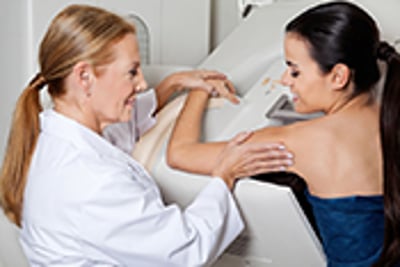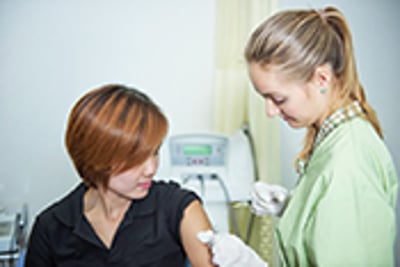Hereditary Cancer



Relevance: Medium-High
Most relevant for: Women at average risk for breast cancer
Study: Does aspirin lower a woman’s breast cancer risk?
Women who take aspirin regularly may have a reduced risk of breast cancer. However, previous studies have reported mixed results. Few of these studies have looked at whether this potential benefit of aspirin is linked to specific types of breast cancer. This study found a small reduction in breast cancer risk for women who took a low-dose aspirin at least three times per week, but only for one subtype of breast cancer. Women who took aspirin were less likely to develop ER/PR-positive, Her2- negative breast cancer, the most common type of breast cancer. This study found no breast cancer risk reduction for women who used regular-dose aspirin or other nonsteroidal anti-inflammatory drugs (NSAIDS). (8/29/17)
READ MORE ›


Relevance: Medium-High
Most relevant for: Parents who have an inherited gene mutation
Article: Parents face challenges when deciding the best time to tell children that they may be at high risk for cancer
When certain types of cancers run in families, genetic testing can determine whether the cause is hereditary. Genetic testing can help family members understand their cancer risk and make medical decisions to stay healthy. A test result can provide significant insight, but it also creates challenges for parents, because gene mutations that cause hereditary cancers can be passed from mothers and fathers to sons and daughters. People with these mutations must make difficult decisions about when to tell their children that they too may have inherited the mutation. (8/22/2017)
READ MORE ›


Relevance: Medium
Most relevant for: Asian American women
Study: Breast cancer rates are rapidly increasing among Asian women in California
The majority of racial groups in the United States have seen declines in breast cancer rates. However, this study provides new insights into the patterns of breast cancer rates in Asian American subgroups in California. Using 26 years of data, this research found that breast cancer is rapidly increasing among this population, contrasting to a decline in rates among non-Hispanic white women in California and nationwide. (8/15/17)
READ MORE ›


Relevance: Medium
Most relevant for: Women at average risk for breast cancer
Study: Do physicians recommend breast cancer screenings based on guidelines?
Several guidelines help physicians decide when a woman should begin screening for breast cancer and how often she should be screened. However, are these guidelines put into use in the clinic? (8/8/17)
READ MORE ›


Relevance: Medium-Low
Most relevant for: High risk women who have not had breast cancer
Article: Report on vaccines to prevent hereditary cancer
On 05/30/2017, Good Morning America aired a segment entitled “Can a vaccine help prevent breast cancer at its earliest stages?” The story outlines the need for cancer prevention and hints at early research into a cancer vaccine. (8/1/17)
READ MORE ›


Relevance: High
Most relevant for: Women with an inherited mutation in BRCA1 or BRCA2
Study: New cancer risk estimates for BRCA1/2 mutation carriers
Cancer risk estimates for BRCA1 and BRCA2 mutation carriers are important because they impact patient decision-making. Until now, almost all risk estimates for mutation carriers were based on results of retrospective studies that looked back on mutation carriers who had cancer. This new study is prospective—it followed almost 10,000 BRCA mutation carriers without cancer to see if or when they developed breast or ovarian cancer. The cancer risk estimates of this study may be more accurate because it followed mutation carriers who did not have cancer over time. (7/28/17)
READ MORE ›


Relevance: Medium-High
Most relevant for: Adolescent and young adult women
Study: Diet during teen years and early adulthood is linked to breast cancer risk
During teen years, breast tissue grows rapidly in young girls and is more likely to be harmed by substances that are known to cause cancer. Few studies have looked at the relationship between diet during puberty and breast cancer risk. This study looks at how a woman’s diet during their teenage years and early adulthood is associated with breast cancer development later in life. (6/30/17)
READ MORE ›


Relevance: High
Most relevant for: People diagnosed with or concerned about their risk for cancer
Article: FDA busts myths of preventing and treating cancer by eating apricot kernels, herbs, and other ingredients
Maggie Fox (NBC News) writes about a new FDA report that warns of 14 "fraudulent” cancer products claiming to either cure or treat cancer (1). The companies that sell these products claim that many of them also prevent cancer, but are they safe or effective? (6/26/17)
READ MORE ›


Relevance: Medium-High
Most relevant for: Women who work night shifts or have in the past
Study: Does working night shifts increase breast cancer risk?
The World Health Organization’s International Agency for Research on Cancer (IARC) classified night shift work as a possible risk factor for breast cancer in 2007, although the majority of the evidence for this claim came from studies of animals after their normal sleep-wake cycle was disrupted. The authors of this study surveyed women from three different cohorts to examine whether night shift work can increase a woman’s breast cancer risk. (3/24/17)
READ MORE ›


Relevance: High
Most relevant for: Women diagnosed with early-stage breast cancer
Study: Patient experiences with genetic testing
Patients can now find out if they have a mutation in more than 20 different genes that are associated with cancer risk, thanks to research advances and the decreasing cost of genetic testing. However, patients’ experiences and use of genetic counseling and testing with these changes are unknown. Do patients want genetic testing? Are they getting tested? (3/7/17)
READ MORE ›